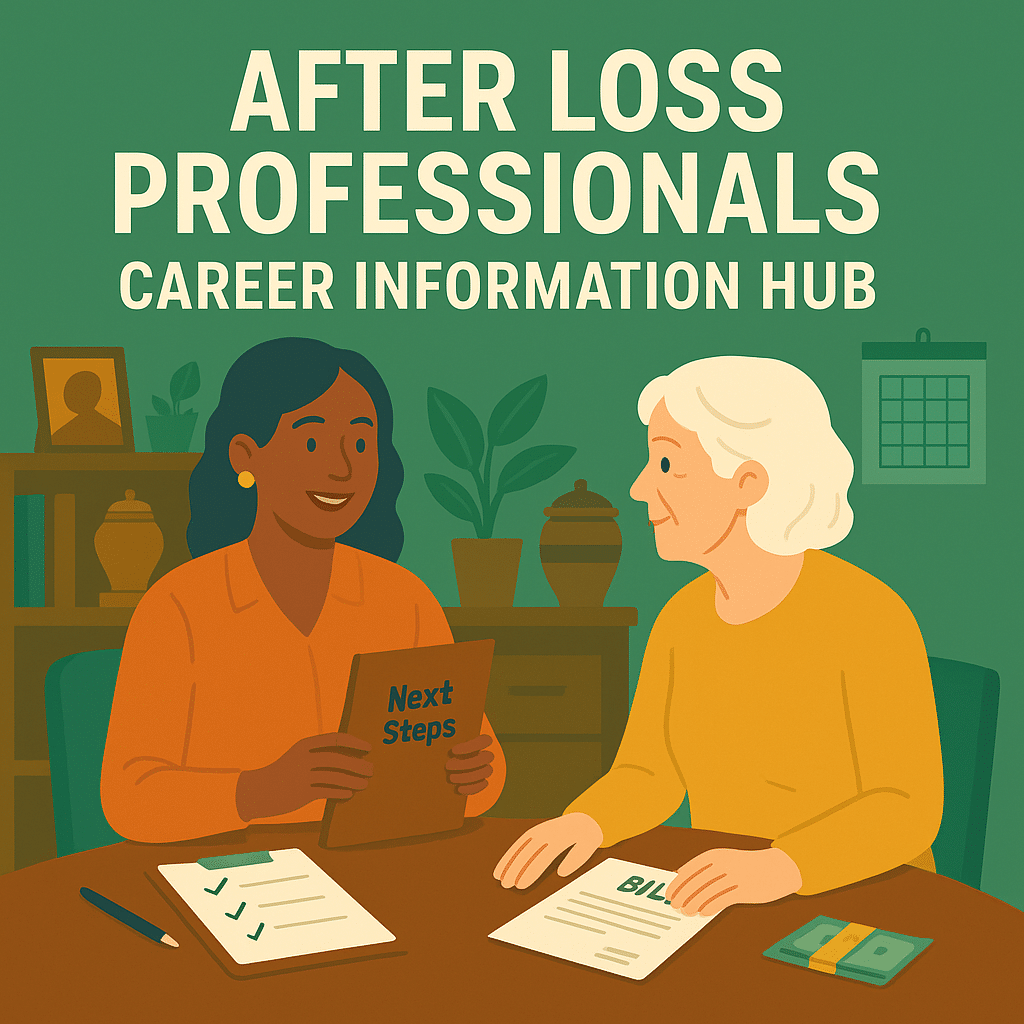Supporting families after the funeral is over
The After Loss Professionals Career Information Hub
After loss professionals step in when the services end but the to-do list begins. From sorting bills and closing accounts to offering emotional support and practical guidance, these compassionate experts help families move forward. Whether you’re drawn to organization, counseling, or simply being a steady presence during a tough time, this career path offers meaningful ways to make a difference.

Key Things To Know
After loss professionals help bridge the gap between grief and getting things done, offering both emotional and logistical support.
- It’s not just grief support: These roles often involve helping families with paperwork, bills, account closures, and final tasks.
- Many backgrounds can lead here: People come from social work, estate services, event planning, or even customer service.
- Empathy is essential: Clients are often overwhelmed, so patience and kindness matter just as much as task management.
- You’ll be a trusted guide: Whether organizing belongings or explaining what comes next, you help people regain a sense of control.
- Flexibility is a plus: These roles may be full-time, part-time, freelance, or part of a larger organization.
- Training varies by niche: Some areas, like grief coaching, may require certifications, while others rely on experience and soft skills.
- Your work brings relief: Families often feel lost after the funeral. Your calm and clarity can be exactly what they need.
Why Choose This Career?
If you're drawn to meaningful work that combines empathy, organization, and problem-solving, becoming an after loss professional offers a unique opportunity to support families during one of life's most challenging transitions.
Key Reasons to Consider This Path
- Provide Comprehensive Support: Assist clients with a wide range of tasks, from estate cleanouts to coordinating with attorneys and financial advisors, ensuring nothing falls through the cracks.
- Be a Trusted Guide: Help executors and family members navigate the complex administrative responsibilities that arise after a death, offering clarity and direction.
- Offer Personalized Assistance: Tailor your services to meet the unique needs of each client, providing one-on-one support that addresses both logistical and emotional challenges.
- Fill a Critical Gap: Step in where traditional roles like estate attorneys or financial planners may not, offering holistic support that encompasses all aspects of post-loss responsibilities.
- Flexible Career Opportunities: Operate independently or within organizations, with options for virtual or in-person services, allowing for a career that fits your lifestyle.
- Make a Meaningful Impact: Play a vital role in helping families find peace and order during a time of grief, making a lasting difference in their lives.
Job Responsibilities
After loss professionals step in after the funeral to help families handle the many personal, legal, and financial tasks that follow a death. The role combines logistical support, estate coordination, and compassionate guidance.
- Organize and manage personal affairs: Help clients sort through belongings, clean out homes, and prepare properties for sale or transition.
- Assist with paperwork and accounts: Support families in locating documents, canceling services, updating beneficiaries, and notifying relevant agencies.
- Coordinate with professionals: Serve as a liaison between the family and attorneys, financial advisors, realtors, or funeral homes to keep everything on track.
- Guide executors and surviving family members: Provide checklists, timelines, and hands-on assistance to help them fulfill legal and practical duties.
- Offer emotional support: Be a steady, calm presence as families navigate grief, decisions, and overwhelm.
- Customize services to each situation: Every family is different. You may provide one-time help or ongoing support across weeks or months.
- Track progress and maintain communication: Keep organized records and regularly update clients to ensure transparency and peace of mind.
Education and Certification Requirements
There’s no single path to becoming an after loss professional, but a mix of relevant education, experience, and specialized training can help you stand out.
- No formal degree required: Many professionals enter the field with backgrounds in social work, estate planning, senior care, or administration.
- Helpful degrees or coursework: Fields like psychology, business, social work, gerontology, or grief studies can provide valuable foundations.
- Certifications can build credibility: While not mandatory, training in areas such as grief support, professional organizing, or estate administration can strengthen your practice.
- Recommended certifications may include: PALS, Grief Support Specialist certification, Certified Senior Advisor (CSA), Death Doula or End-of-Life Coach training, and NAPO (National Association of Productivity and Organizing Professionals) membership or training
- Local business license: If you’re working independently, check state and local requirements for service-based businesses.
- On-the-job learning is common: Many after loss professionals build their skills through experience and mentorship, often starting part-time or alongside related work.
How To Get Started
Becoming an after loss professional doesn’t require a specific degree or license, but it does call for empathy, organization, and a willingness to help with both emotional and logistical challenges.
Here’s how to begin:
- Start with your strengths: Think about what you already bring to the table. Maybe it’s estate experience, counseling skills, organizing expertise, or simply being the go-to helper in your community.
- Learn the landscape: Explore the services typically offered by after loss professionals, such as account closures, document organization, home cleanouts, or executor support. Reading case studies and shadowing others can help.
- Take relevant training: Consider enrolling in grief support, professional organizing, end-of-life planning, or estate administration courses. Certifications aren’t required, but they can boost confidence and credibility.
- Volunteer or assist informally: Many people get their start by helping a friend or relative through a loss. Those experiences are often what inspire people to build a professional practice.
- Build your service offering: Decide if you want to work independently, partner with estate professionals, or join an organization. Create a clear list of services, pricing, and referral pathways.
- Join a professional community: Groups like AfterLossPros.com and related networks can offer training, templates, support, and connection to others in the field.
Common Myths
There’s still a lot of confusion about what after loss professionals actually do. Here are some of the most common myths, along with the real story.
What Makes Someone A Good Fit
After loss work isn’t for everyone, but for the right person, it’s one of the most meaningful ways to serve others.
This role is ideal for people who are:
- Empathetic and calm under pressure: You’ll be supporting clients during one of the most stressful times in their lives. A steady, reassuring presence makes a big difference.
- Organized and detail-oriented: Whether you’re tracking paperwork, managing timelines, or coordinating with service providers, keeping things in order is key.
- A good listener: Sometimes the most valuable thing you offer is a safe space to talk while getting things done.
- Comfortable with grief and emotion: You don’t need to be a counselor, but you do need to hold space for sadness, confusion, and occasional family tension.
- Resourceful and proactive: Families won’t always know what they need. Being able to anticipate next steps and offer practical solutions is essential.
- Discreet and trustworthy: You’ll often be handling private information, legal documents, and access to personal belongings. Integrity matters.
Articles
Frequently Asked Questions
Still have questions? Here’s what people often ask when exploring this meaningful and hands-on career path.
Disclaimer: The information provided on this website and by Buried in Work is for general informational purposes only and should not be considered legal advice. Please consult with a qualified attorney or subject matter expert for advice specific to your situation.

